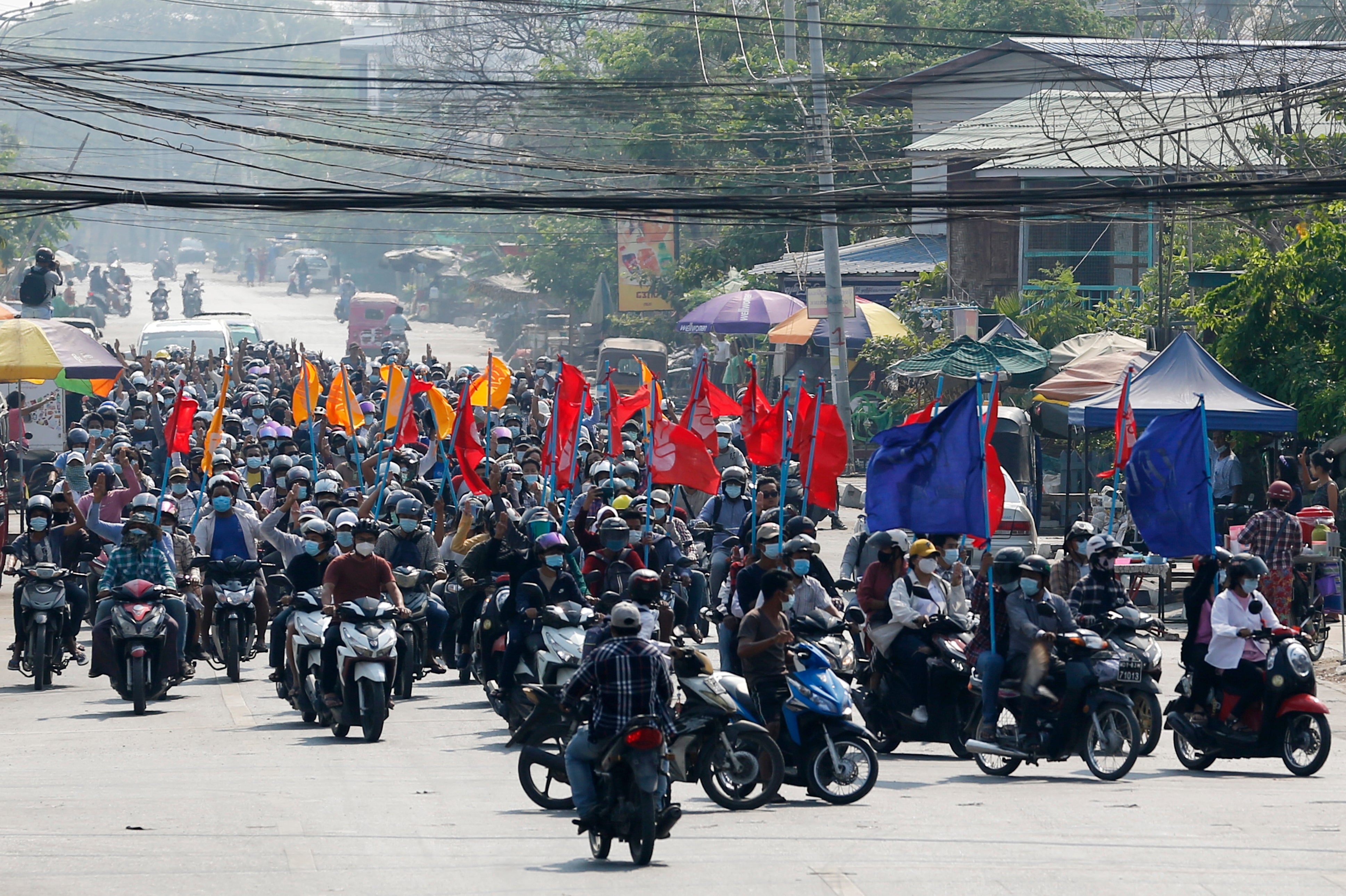Britain And Australia's Myanmar Sanctions: A Critical Analysis Of Their Purpose

Table of Contents
The Rationale Behind Britain and Australia's Myanmar Sanctions
Britain and Australia's sanctions against Myanmar stem from the February 2021 military coup, which overthrew the democratically elected government and plunged the nation into further turmoil. These actions were predicated on the escalating human rights violations perpetrated by the Tatmadaw (Myanmar military), including the ongoing Rohingya crisis and the widespread violence against ethnic minorities and pro-democracy activists. The sanctions are justified under international law, drawing on UN Security Council resolutions and principles enshrined in international human rights law, aiming to hold the perpetrators accountable and pressure the military regime to restore democracy.
- Specific human rights violations targeted: Extrajudicial killings, torture, arbitrary detention, sexual violence, forced displacement, and restrictions on freedom of expression and assembly.
- Types of sanctions imposed: Asset freezes targeting key individuals and entities within the military regime, travel bans preventing sanctioned individuals from entering Britain and Australia, and arms embargoes restricting the flow of weapons to the Tatmadaw.
- Key individuals and entities sanctioned: This includes senior military leaders, members of the State Administrative Council (SAC), and businesses linked to the military, significantly impacting their access to international finance and trade.
Assessing the Effectiveness of the Sanctions Regime
The effectiveness of Britain and Australia's Myanmar sanctions remains a complex and debated issue. While the sanctions aim to cripple the military's financial resources and limit its access to international support, their impact has been uneven. Enforcement challenges, including sanctions evasion through opaque financial networks and the exploitation of loopholes, hinder their full potential. Furthermore, the impact on the civilian population is a significant concern, with reports suggesting that sanctions may disproportionately affect vulnerable groups, exacerbating existing inequalities.
- Evidence of sanctions' effectiveness (or lack thereof): While some reports indicate a decline in certain sectors of the Myanmar economy, the military regime has demonstrated resilience, adapting to sanctions and utilizing alternative financial channels. A comprehensive assessment requires further investigation.
- Examples of sanctions evasion: Reports highlight the use of shell companies, offshore accounts, and informal cross-border trade to circumvent sanctions. Enhanced international cooperation is crucial to curb these practices.
- Data on economic impact: Economic data shows a contraction in Myanmar's GDP, although attributing this solely to sanctions is difficult due to pre-existing economic vulnerabilities and the ongoing conflict.
- Reports on humanitarian impact: Humanitarian organizations express concerns about the impact of sanctions on access to essential goods and services for the civilian population, particularly in conflict-affected areas.
The Human Rights Impact: Intended and Unintended Consequences
The core objective of Britain and Australia's Myanmar sanctions is to improve the human rights situation. While intended to pressure the military regime, the sanctions have had both positive and negative consequences on human rights. The limitations on the military’s access to resources could potentially curb their capacity for further abuses. However, the economic hardship caused by sanctions has arguably worsened the living conditions of ordinary citizens, limiting access to healthcare, education, and essential goods. This underscores the need for a nuanced approach that balances pressure on the regime with protection for vulnerable populations.
- Examples of positive human rights outcomes: The sanctions may have contributed to a greater focus on human rights violations by international actors, increased pressure on the military regime, and potentially limited certain types of abuses.
- Examples of negative human rights outcomes: The economic hardship caused by sanctions has exacerbated poverty and inequality, affecting access to essential services for vulnerable populations.
- Analysis of humanitarian aid effectiveness: The effectiveness of humanitarian aid in mitigating the negative consequences of sanctions is crucial, requiring improved coordination and access to affected communities.
- Case studies of impact on specific vulnerable groups: Further research is needed to analyze the differential impact of sanctions on specific groups, such as women, children, and ethnic minorities.
Alternative Approaches and Policy Recommendations
While sanctions play a role, a multifaceted approach is needed to address the crisis in Myanmar. This requires exploring alternative strategies beyond solely relying on punitive measures. Strengthening international cooperation and diplomatic engagement to exert pressure on the military regime is crucial. A focus on targeted sanctions, carefully designed to minimize harm to the civilian population while maximizing pressure on the military, is preferable to broad economic sanctions. Moreover, supporting civil society organizations and promoting accountability mechanisms for human rights abuses are vital components of a comprehensive strategy.
- Specific alternative strategies: Targeted financial pressure on specific individuals and entities linked to human rights abuses, diplomatic initiatives focused on a political solution, international criminal justice mechanisms to hold perpetrators accountable.
- Recommendations for improving sanction design and implementation: Strengthening international cooperation to prevent sanctions evasion, utilizing more sophisticated financial tracking mechanisms, and ensuring mechanisms for humanitarian exemptions.
- Potential role of regional organizations (e.g., ASEAN): A more unified and effective regional response from ASEAN could exert significant pressure on the Myanmar military regime.
Conclusion: A Critical Look at Britain and Australia's Myanmar Sanctions
This analysis demonstrates that Britain and Australia's Myanmar sanctions, while intending to address grave human rights violations, present a complex picture. Their effectiveness is debated, with both intended and unintended consequences impacting the civilian population. While the sanctions have arguably limited the military's capacity to some degree, their impact has been inconsistent and the potential for harm to civilians remains a serious concern. A more comprehensive approach that balances targeted pressure on the regime with robust support for the civilian population, coupled with a strong emphasis on international cooperation and accountability, is crucial to resolving the crisis in Myanmar. Continued critical evaluation and potential adjustments to Britain and Australia's Myanmar sanctions policies are essential to ensure maximum effectiveness while minimizing harm to the civilian population. Further research into the impact of these sanctions, including the development of more precise data on economic and humanitarian consequences, is urgently needed.

Featured Posts
-
 Vyplaty Veteranam Velikoy Otechestvennoy Voyny V Eao V 2025 Godu
May 13, 2025
Vyplaty Veteranam Velikoy Otechestvennoy Voyny V Eao V 2025 Godu
May 13, 2025 -
 30 Evvel Ezelott Leonardo Di Caprio Legyozte A Heroin Fueggoseget
May 13, 2025
30 Evvel Ezelott Leonardo Di Caprio Legyozte A Heroin Fueggoseget
May 13, 2025 -
 Chto Sluchilos S Sobolenko V Madride Podrobnosti Skandala
May 13, 2025
Chto Sluchilos S Sobolenko V Madride Podrobnosti Skandala
May 13, 2025 -
 New Ceo Takes Helm At Four Walls
May 13, 2025
New Ceo Takes Helm At Four Walls
May 13, 2025 -
 Betting On The Nba Draft Lottery Toronto Raptors And Cooper Flaggs Chances
May 13, 2025
Betting On The Nba Draft Lottery Toronto Raptors And Cooper Flaggs Chances
May 13, 2025
